Icahn Enterprises Bundle
Who Really Calls the Shots at Icahn Enterprises?
The ownership structure of any company is a fundamental blueprint, dictating its strategic decisions and overall trajectory. A deep understanding of who owns a company like Icahn Enterprises L.P. is essential for anyone seeking to grasp its operational philosophy and future prospects. This knowledge is particularly vital given the company's history of active involvement and strategic investments across diverse sectors.
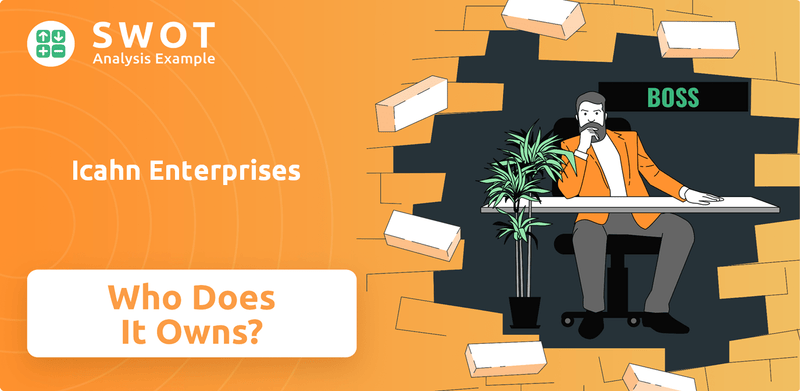
Icahn Enterprises, a Icahn Enterprises SWOT Analysis can show the company's strengths and weaknesses, was founded by Carl C. Icahn, and its ownership structure has always been a key factor in its approach. Understanding the company's ownership reveals insights into its investment strategies, the influence of its major shareholders, and the potential impact on its Icahn Enterprises stock performance. This examination will explore the evolution of Icahn Enterprises investors and the role of Icahn Enterprises subsidiaries.
Who Founded Icahn Enterprises?
The company, Icahn Enterprises L.P., was established in 1987 by Carl C. Icahn. Carl Icahn, a well-known American businessman, investor, and philanthropist, is known for his activist investor approach. He would take significant stakes in companies and push for major corporate changes to increase shareholder value.
The ownership structure of Icahn Enterprises is primarily influenced by its status as a master limited partnership (MLP). In an MLP, there are general and limited partners. Carl Icahn, through his affiliates, effectively controls the general partner, which manages the company's operations and business activities. This structure gives the general partner significant control and decision-making power. Early investors were mainly limited partners investing in the partnership, rather than traditional equity shareholders in a corporation.
Details about the initial equity split at the company's start are not publicly available. However, it's well-known that Carl Icahn held, and continues to hold, a controlling interest in the enterprise. Information on early angel investors or friends and family acquiring stakes isn't readily available in public filings, as the focus has always been on Icahn's controlling influence and the public trading of the limited partnership units. Any early agreements, like vesting schedules or buy-sell clauses, would primarily be internal arrangements within Icahn's private entities that control the general partner, rather than publicly disclosed agreements for early outside investors in the MLP. The founding team's vision, driven by Carl Icahn, was clearly reflected in this concentrated distribution of control, enabling quick and decisive action in investment and operational strategies.
Icahn Enterprises was founded by Carl C. Icahn in 1987.
The company operates as a master limited partnership (MLP).
Carl Icahn, through his affiliates, controls the general partner.
Early backers were primarily limited partners.
The focus has been on Icahn's controlling influence and public trading.
The founding team's vision, driven by Carl Icahn, allowed for decisive action.
Understanding the ownership structure of Icahn Enterprises is crucial for investors and those interested in the company. The company's structure as an MLP gives Carl Icahn significant control. The company's focus on activist investing has shaped its strategy and operations over the years. For those interested in learning more about the competitive landscape, consider reading about the Competitors Landscape of Icahn Enterprises.
- Carl Icahn is the primary .
- The company's structure is a master limited partnership (MLP).
- Icahn, through his affiliates, controls the general partner.
- Early investors were mainly limited partners.
Icahn Enterprises SWOT Analysis
- Complete SWOT Breakdown
- Fully Customizable
- Editable in Excel & Word
- Professional Formatting
- Investor-Ready Format
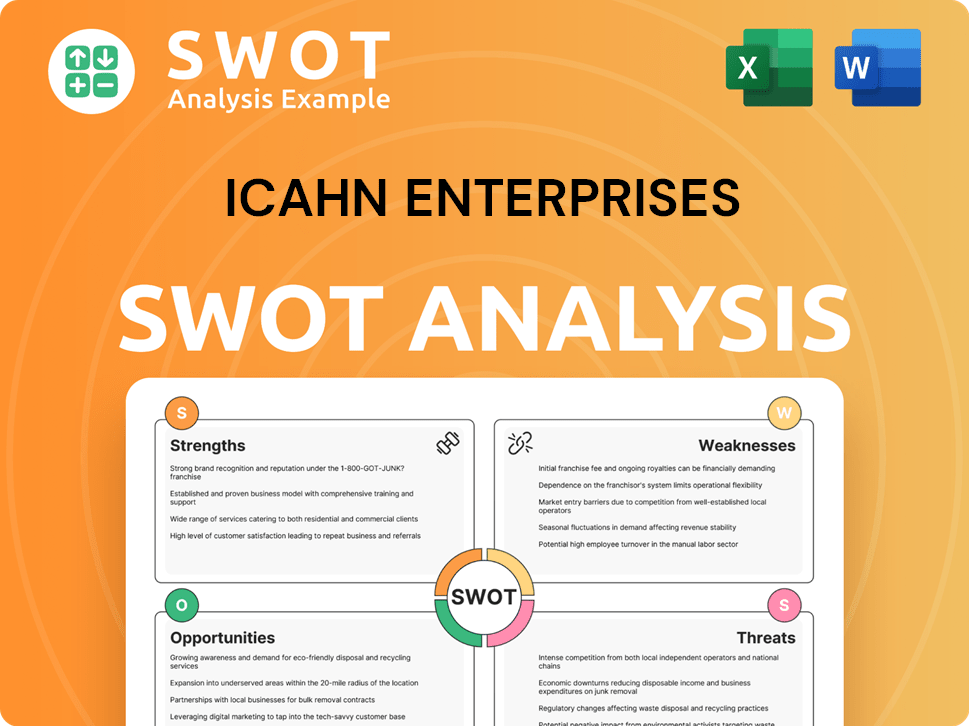
How Has Icahn Enterprises’s Ownership Changed Over Time?
The ownership structure of the Carl Icahn company, Icahn Enterprises L.P., is largely shaped by Carl Icahn's significant stake. As a publicly traded master limited partnership (MLP), its units are traded on the NASDAQ. While the initial public offering (IPO) date isn't directly comparable to a traditional corporation, the limited partnership units have been publicly traded for a considerable time. Carl Icahn, through affiliated entities, has maintained a substantial majority stake, a defining feature of the company's ownership. As of early 2025, Carl Icahn's beneficial ownership, including units held by his affiliates, has consistently been reported at over 80%. This level of ownership gives him effective control over the partnership's strategic direction and operations. This structure ensures that major strategic shifts are primarily driven by Carl Icahn's vision.
Major stakeholders beyond Carl Icahn include institutional investors, mutual funds, and individual investors holding the publicly traded limited partnership units. These institutional holders encompass a range of asset managers and investment funds. Their individual stakes are smaller than Icahn's, but their collective ownership represents the public float. For example, in early 2025, top institutional holders included firms like Vanguard Group, BlackRock, and State Street Global Advisors, common among publicly traded entities, although their percentages are relatively small compared to Icahn's dominant stake. Changes in these institutional holdings reflect typical market movements and investment strategies. The consistent ownership by Carl Icahn means that major shifts in company strategy and governance are primarily driven by his decisions.
| Ownership Aspect | Details | As of Early 2025 |
|---|---|---|
| Carl Icahn's Ownership | Beneficial ownership through affiliates | Over 80% |
| Public Float | Held by institutional and individual investors | Less than 20% |
| Top Institutional Holders | Vanguard Group, BlackRock, State Street Global Advisors | Variable, small percentages |
The consistent majority ownership by Carl Icahn has a significant impact on the company's strategic direction. The Target Market of Icahn Enterprises is influenced by the decisions of its primary owner. This control allows Icahn to drive major shifts in strategy and governance based on his vision. This influence shapes the company's investment decisions and overall business model.
Carl Icahn's substantial ownership gives him significant control over Icahn Enterprises. Institutional investors and the public hold the remaining shares, influencing the stock's trading. Understanding the ownership structure is crucial for assessing the company's strategic direction.
- Carl Icahn's majority stake ensures his control.
- Institutional investors hold a portion of the public float.
- Ownership structure impacts strategic decisions.
- The company is a publicly traded master limited partnership.
Icahn Enterprises PESTLE Analysis
- Covers All 6 PESTLE Categories
- No Research Needed – Save Hours of Work
- Built by Experts, Trusted by Consultants
- Instant Download, Ready to Use
- 100% Editable, Fully Customizable
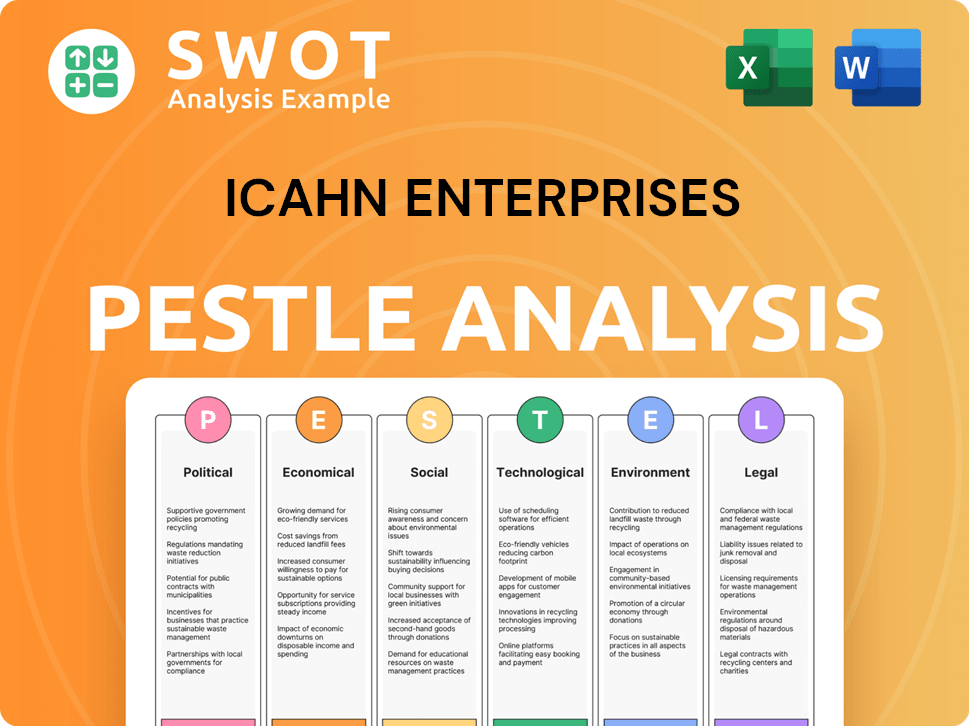
Who Sits on Icahn Enterprises’s Board?
The Board of Directors of the Carl Icahn company, Icahn Enterprises L.P., significantly influences the company's governance. As of early 2025, the board typically includes Carl C. Icahn himself, often serving as Chairman, alongside other directors. The board's structure often reflects the concentrated ownership, with members potentially representing Icahn's interests or acting as independent members. The specific composition can change, but the board's core function remains to oversee the company's operations and strategic decisions.
The board's role is crucial, especially considering the company's diverse holdings and financial activities. Understanding the board's composition is vital for Icahn Enterprises investors and those interested in the company's strategic direction. The board's decisions impact the performance of Icahn Enterprises stock and the overall value of the company's assets.
| Director | Title | Affiliation |
|---|---|---|
| Carl C. Icahn | Chairman | Icahn Enterprises |
| (Other Directors) | (Various) | (Various) |
| (Other Directors) | (Various) | (Various) |
The voting structure of Icahn Enterprises L.P. grants voting rights to limited partners based on their unit holdings. However, Carl Icahn's majority ownership, combined with his control of the general partner, gives him substantial control. The general partner, controlled by Icahn, has significant authority over operations and strategic decisions. This structure effectively shields the company from significant external pressure, shaping decision-making. For more details on the business model, you can refer to Revenue Streams & Business Model of Icahn Enterprises.
The Board of Directors is crucial for Icahn Enterprises. Carl Icahn's influence is significant due to his ownership.
- The board typically includes Carl Icahn as Chairman.
- Voting rights are primarily based on unit holdings, but Icahn's control is dominant.
- The general partner, controlled by Icahn, has significant authority.
- This structure provides Icahn with considerable control over the company.
Icahn Enterprises Business Model Canvas
- Complete 9-Block Business Model Canvas
- Effortlessly Communicate Your Business Strategy
- Investor-Ready BMC Format
- 100% Editable and Customizable
- Clear and Structured Layout
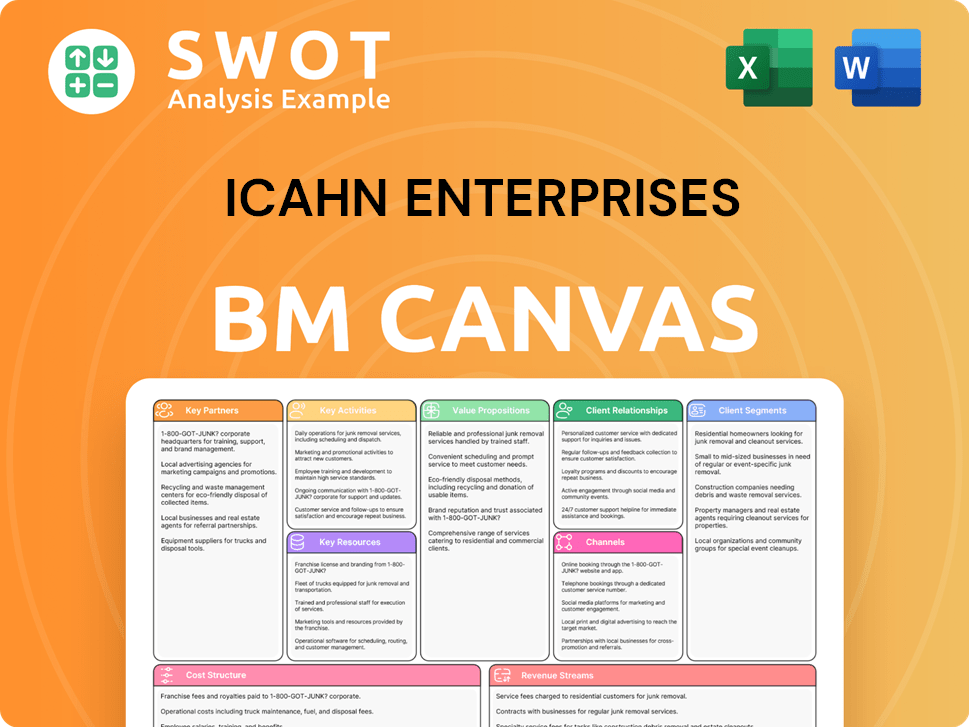
What Recent Changes Have Shaped Icahn Enterprises’s Ownership Landscape?
Over the past few years, the ownership structure of the Carl Icahn company, Icahn Enterprises L.P., has remained largely consistent. The dominant control of Carl C. Icahn has been a constant feature. Market activities, such as trading limited partnership units, have occurred, but significant changes to the overall ownership structure through share buybacks or secondary offerings have not been prominent. The company's strategy continues to focus on its diversified portfolio of investments and operating businesses. Leadership changes within subsidiaries and investment teams have taken place, but Carl Icahn has maintained his overarching presence and strategic direction.
Industry trends, like increased institutional ownership or activist investors, impact Icahn Enterprises differently due to its concentrated ownership. While institutional investors hold units, their influence is limited by Icahn's majority stake. Unlike many public companies, Carl Icahn has maintained his controlling interest, solidifying his long-term vision. There have been no public statements about planned succession that would significantly alter the ownership structure, nor discussions about potential privatization. The ownership remains firmly anchored by Carl Icahn's substantial stake, which drives its strategic direction and market perception. You can learn more about the company by reading the Brief History of Icahn Enterprises.
The company's focus on its diversified portfolio of investments and operating businesses has remained consistent. Leadership changes within subsidiaries and investment teams have occurred, but Carl Icahn has maintained his strategic direction. The company's ownership structure has seen limited changes, with Carl Icahn maintaining significant control.
Carl Icahn's controlling interest has been a key factor in the company's strategic direction. Institutional investor influence is limited by Icahn's majority stake. There have been no public statements about planned succession or privatization. The ownership structure remains firmly anchored by Carl Icahn's substantial stake.
Icahn Enterprises Porter's Five Forces Analysis
- Covers All 5 Competitive Forces in Detail
- Structured for Consultants, Students, and Founders
- 100% Editable in Microsoft Word & Excel
- Instant Digital Download – Use Immediately
- Compatible with Mac & PC – Fully Unlocked
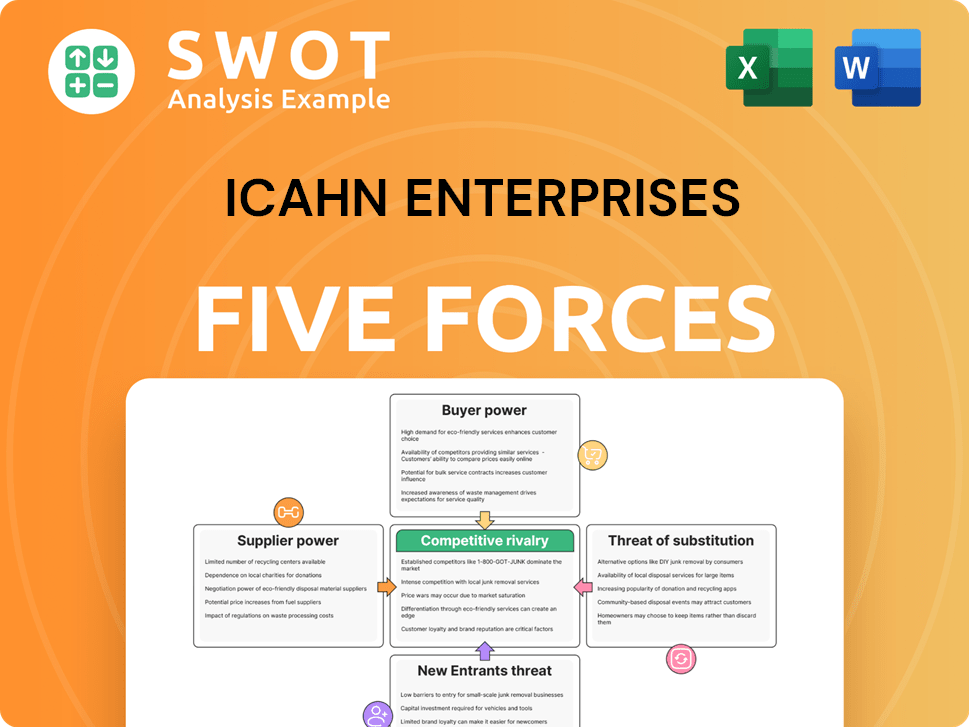
Related Blogs
- What are Mission Vision & Core Values of Icahn Enterprises Company?
- What is Competitive Landscape of Icahn Enterprises Company?
- What is Growth Strategy and Future Prospects of Icahn Enterprises Company?
- How Does Icahn Enterprises Company Work?
- What is Sales and Marketing Strategy of Icahn Enterprises Company?
- What is Brief History of Icahn Enterprises Company?
- What is Customer Demographics and Target Market of Icahn Enterprises Company?
Disclaimer
All information, articles, and product details provided on this website are for general informational and educational purposes only. We do not claim any ownership over, nor do we intend to infringe upon, any trademarks, copyrights, logos, brand names, or other intellectual property mentioned or depicted on this site. Such intellectual property remains the property of its respective owners, and any references here are made solely for identification or informational purposes, without implying any affiliation, endorsement, or partnership.
We make no representations or warranties, express or implied, regarding the accuracy, completeness, or suitability of any content or products presented. Nothing on this website should be construed as legal, tax, investment, financial, medical, or other professional advice. In addition, no part of this site—including articles or product references—constitutes a solicitation, recommendation, endorsement, advertisement, or offer to buy or sell any securities, franchises, or other financial instruments, particularly in jurisdictions where such activity would be unlawful.
All content is of a general nature and may not address the specific circumstances of any individual or entity. It is not a substitute for professional advice or services. Any actions you take based on the information provided here are strictly at your own risk. You accept full responsibility for any decisions or outcomes arising from your use of this website and agree to release us from any liability in connection with your use of, or reliance upon, the content or products found herein.